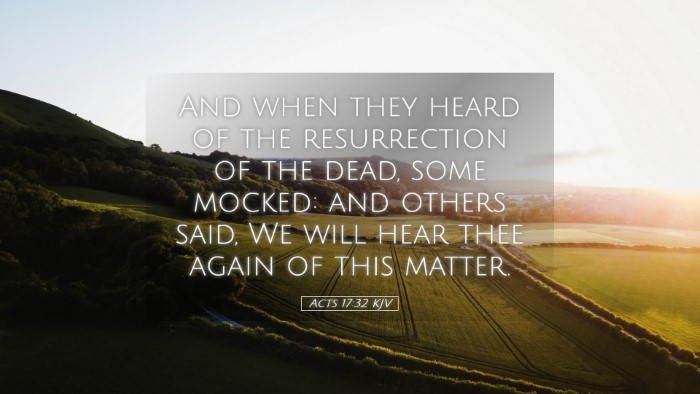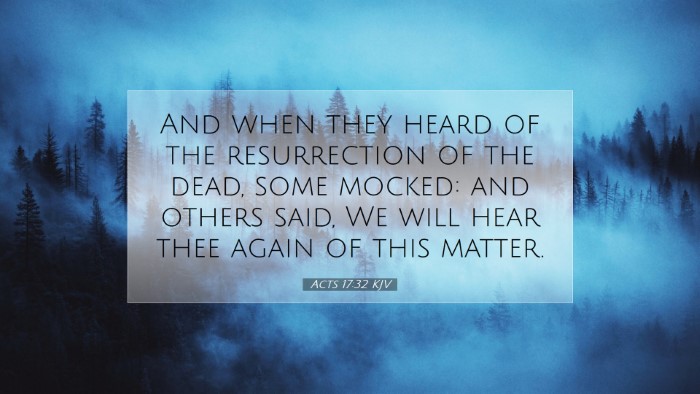Commentary on Acts 17:32
Acts 17:32 states: "And when they heard of the resurrection of the dead, some mocked: and others said, We will hear thee again of this matter." This verse captures the varied responses to the apostolic message of resurrection and serves as a pivotal point in the missionary efforts of Paul.
Contextual Background
The setting of Acts 17 is crucial for understanding this verse. Paul is in Athens, a city steeped in philosophy and the worship of many gods. His speech at the Areopagus (or Mars Hill) articulates the Christian doctrine of resurrection—a concept that was foreign and even absurd to many of the Athenian philosophers.
Insights from Public Domain Commentaries
-
Matthew Henry's Commentary
Matthew Henry notes that Paul's proclamation of the resurrection elicited mixed reactions. He emphasizes that the doctrine of the resurrection is central to Christian faith and highlights the contrast between faith and skepticism. Henry points out that while some mocked, the differing responses underline humanity's varied openness to spiritual truths. Some were curious enough to express a desire to discuss these ideas further, indicating a potential for spiritual inquiry and dialogue.
-
Albert Barnes' Notes
Albert Barnes elaborates on the philosophical context of Athens during Paul's visit. He remarks that the Athenians were accustomed to new ideas but found the message of resurrection particularly challenging. Barnes emphasizes the importance of the resurrection in the believer's faith journey, defending it as foundational. He also suggests that the mocking response reflects a broader skepticism present in secular society concerning divine intervention in human affairs. Those who desired to hear more were indicative of the intellectual curiosity that often accompanies genuine spiritual searching.
-
Adam Clarke's Commentary
Adam Clarke brings attention to the cultural and religious backdrop of the Athenians. He states that the resurrection of the dead was a critical tenet of the early Christian Church, yet it clashed significantly with Greek philosophical understanding, which often viewed the body as a prison for the soul. Clarke's analysis includes the argumentative nature of the Athenian philosophers, who preferred debate and discussion over acceptance of new doctrines. He highlights this encounter as fundamental to understanding the Christian mission: to proclaim a message that challenges prevailing beliefs and invites deeper exploration.
Theological Implications
The reaction to Paul's declaration of the resurrection signifies deeper theological implications for contemporary faith communities. Firstly, there exists an enduring tension between faith and skepticism. The mockery received may discourage modern believers, yet it serves as a reminder that such responses are not new nor uncommon. The varied responses also encourage dialogue and further inquiry into spiritual matters—a practice that should be embraced in the pursuit of understanding faith today.
Lessons for Pastors and Theologians
-
Embrace Inquiry: The desire of some Athenians to hear more reflects a thirst for theological discussion. Pastors and theologians should create environments where doubt and skepticism can be expressed and explored.
-
Importance of Resurrection: The emphasis on resurrection illustrates its centrality in the Christian faith. Pastoral teachings should prioritize this doctrine as it encapsulates the hope of eternal life and the promise of transformation through Christ.
-
Cultural Context Matters: Understanding the cultural milieu of Acts 17 is vital for modern application. Engaging with the philosophical and cultural frameworks of today can render the message of the Gospel more relatable and comprehensible.
Conclusion
Acts 17:32 serves as a reminder that the message of the resurrection remains potent in its ability to provoke thought, challenge disbelief, and instigate dialogue. The varied responses encountered by Paul in Athens echo through history, calling pastors, students, and theologians alike to engage with doubts and inquiries while firmly grounding their faith in the resurrection of Jesus Christ. This pivotal verse not only enriches our understanding of the early Church's mission but also compels us to rethink how we share the Gospel in today's complex world.


